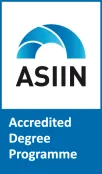The newsletter is your guide to what's happening on LUT campuses and the student community as well as to bachelor's and master's programmes updates and admission instructions. Newsletters will be delivered to your email once a month.


The programme is accredited by international EUR-ACE® and ASIIN standards for high quality degree programmes in engineering.
Chemical engineering today is facing new challenges and opportunities. To mitigate global warming, fossil resources need to be replaced by renewable ones. That is an enormous task, but also a great opportunity for chemical engineers since new processes and products need to be developed.
In this master’s programme, you will learn how processes are developed and designed. You will learn about traditional chemical engineering, the modelling of unit operations, separation processes, process simulation, process development, computational fluid dynamics, and product and process design. The studies give you the skills you need to work in any sector of chemical or process industry.
In addition, the studies introduce current topics related to the conversion of renewable energy into chemical products, such as hydrogen production, carbon capture, and the synthesis of fuels and chemicals from renewable power. The focus will be on the energy efficiency of processes and competitive product costs. Moreover, the studies deal with process intensification, where compact, energy-efficient and cost-effective solutions will make the chemical industry competitive also in future.
Teaching in this master's programme is based on existing challenges in chemical engineering. The programme includes lectures, exercises, assignments, and student projects. Novel teaching methods are applied. Several courses apply group design projects. The assignments are often about industrial topics and problems in converting power into chemicals.
The programme takes place on campus in Lappeenranta. However, the programme may include some distance learning courses depending on the selections made by the student.
Who is this programme for?
This programme is for you if you want to innovate chemical engineering to solve environmental challenges related to carbon emissions and global warming. You are passionate about novel ideas for promoting sustainability.
In addition, you have
- a bachelor’s degree in chemical engineering
- skills in laboratory work and experiments, mathematical modelling and process simulation.
Admissions guide 2026
What will you learn in the programme?
After graduation from the Master’s Programme in Chemical Engineering for Energy Transition, you will be a competent chemical engineering professional in any sector of the chemical and process industry. You will:
- be able to demonstrate strong engineering analysis and problem-solving skills;
- be able to make approximations and decisions under uncertainty based on practical engineering skills;
- have courage to create innovations and new technical solutions;
- be able to develop solutions that take into account issues in environmental protection, especially in the conversion of renewable energy into carbon-neutral fuels and chemicals;
- possess project work and communication skills needed in a modern working environment.
Degree structure and studies
The Master’s Programme in Chemical Engineering for Energy Transition is a two-year programme. It leads to the degree of Master of Science in Technology, M.Sc. (Tech.), which is 120 ECTS credits.
Studies in this programme are a combination of contact teaching on the Lappeenranta campus and online teaching.
The programme includes core, advanced specialisation, and elective studies as well as a master's thesis.
Read more in this academic year’s curriculum.
Career prospects
You will acquire practical skills and the latest information on practices and trends in chemical engineering.
You will be able to find work in many industry sectors, such as the chemical and process industry, fuel production, pulp and paper manufacturing, food processing, energy production, metal and mineral refining, electronics, or the pharmaceutical industry.
Typical job positions include, for example, research and development specialist, design and project engineer or manager, production engineer and manager, environmental and safety engineer, or sales and marketing engineer.
In addition, you will also obtain a firm basis to continue your studies in doctoral programmes.
Contact Admissions Services
The LUT Admissions Services are here to assist you in all matters related to applying to international bachelor's and master's programmes.
For questions about admission criteria or entry requirements, please reach out to us by email: admission@lut.fi.
Chat with our students
Do you want to know more about studying at LUT, student life, or housing on LUT's campuses?
For questions about admission to bachelor's or master's degree studies, please email admission@lut.fi.




